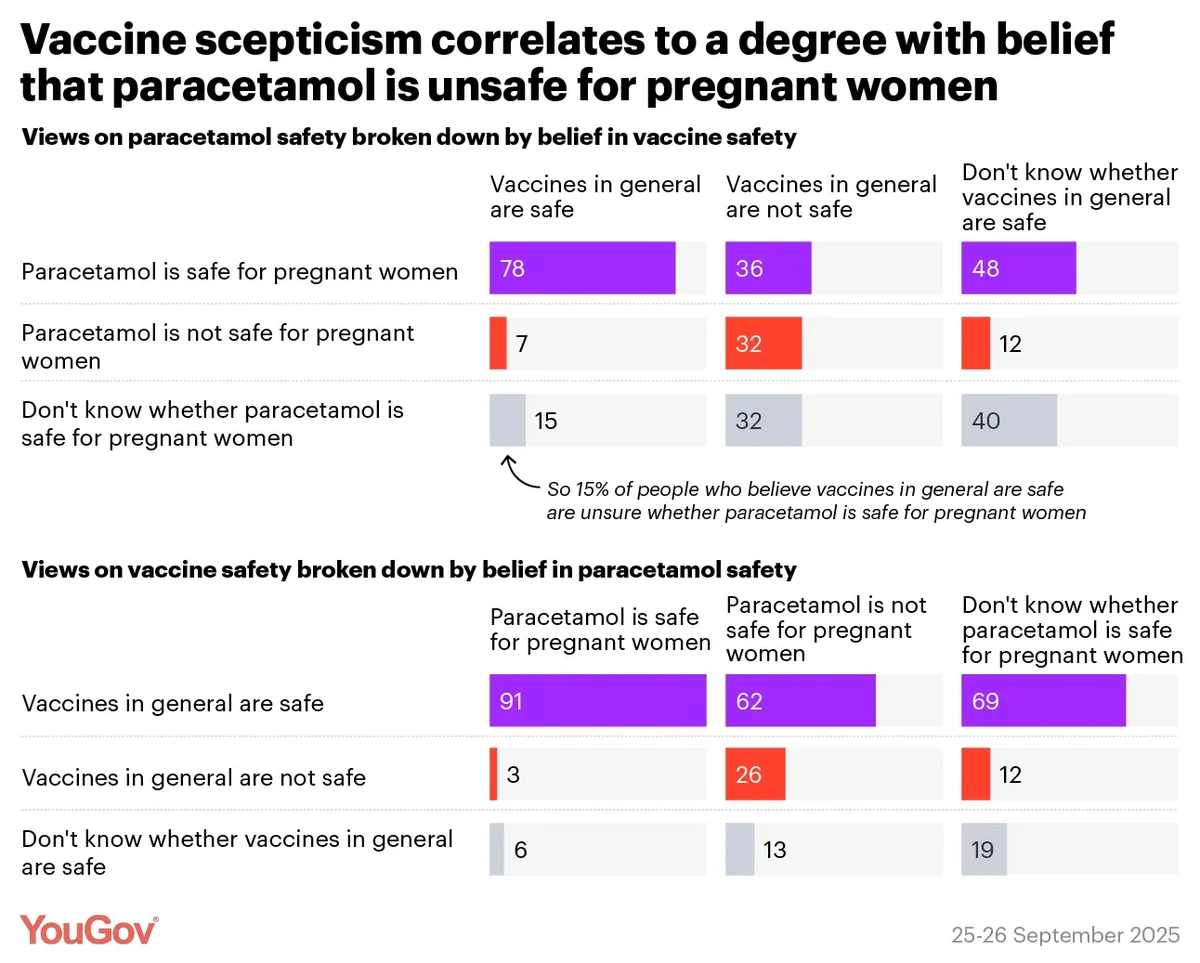The large majority of Britons see paracetamol as safe, and few of those who don’t cite Trump or autism as a reason why
Last week saw Donald Trump claim a link between the use of painkiller Tylenol (a brand name for paracetamol) by pregnant women and an increased risk of autism in some children.
The scientific consensus rejects the president’s view, and here in the UK the NHS reiterated its recommendation that paracetamol is safe for pregnant women to use.
Now a new YouGov study has investigated whether the British public question the safety of paracetamol. The results show that 73% of Britons believe paracetamol to be safe for pregnant women, while 9% consider it unsafe, and 19% are unsure.
To set these results in context, we compared them against other potential risk factors in pregnancy - and some activities that doctors actively recommend.
For example, our survey finds 4% of Britons consider taking folic acid supplements – which women are specifically recommended to do – are unsafe, with a further 29% unsure.
Likewise, 33% of Britons believe soft cheese is safe for pregnant women – despite or in ignorance of advice from health bodies that such food carries a risk of listeria.
It is also notable that women are more likely to say paracetamol is safe than men (77% vs 68%), with the difference being primarily that men are more likely to answer “don’t know” than to say it is not safe.
Reform UK voters are also noticeably more likely to say that paracetamol is unsafe (15%) than other voters (1-8%). This is partly because Reform UK’s electorate skews more heavily male, although female Reform UK voters are still more likely than their non-Reform counterparts to see paracetamol as unsafe.
Why do some people say paracetamol is unsafe?
Of those who say paracetamol is unsafe, few brought up Donald Trump in connection (4%), cited the potential link with autism or neurodevelopmental conditions (5%), or more generally cited “research” (3%) or “recent news” that says you shouldn’t (2%). (These categories are not mutually exclusive, so some respondents will have mentioned several of these at the same time).
By far the most common justifications given are generic statements that paracetamol could have an unspecified impact on the child (20%), while a similar number suggest that taking any drug whatsoever during pregnancy bears risks (19%).
Indeed, 8% went back on themselves and said that it is in fact safe to take paracetamol, but only in small doses.
How does perceived safety of paracetamol correlate with vaccine scepticism?
Our study also delved into the related field of vaccine scepticism, which has been much discussed in recent years, particularly since the COVID-19 pandemic.
Our results find that 84% of Britons say “vaccines in general” are safe, compared to only 7% who see them as unsafe.
We see comparable figures when it comes to the safety of the MMR vaccine more specifically, with 87% saying they think this vaccine is safe, and only 4% unsafe.
However, when it comes to the COVID-19 vaccine, the number answering ‘safe’ drops to 69%, with 16% considering it unsafe.
Again, the results show that Reform UK voters are more likely to be vaccine sceptical than other voters, with 13% saying vaccines in general are unsafe compared to 4% of Labour, Lib Dem, Tory and Green voters.
This is especially the case when it comes to the COVID-19 vaccine, which fully 35% of Reform UK voters consider to be unsafe, compared to only 9-10% of voters from other parties.
Comparing answers across questions shows that belief that paracetamol is unsafe for pregnant women does correlate to a degree with vaccine scepticism. Vaccine sceptics prove to be much less likely to say that paracetamol is unsafe for pregnant women at 36% compared to 78% of those who think vaccines are safe.
However, the majority of those who think paracetamol is unsafe think that vaccines in general are safe (63%). While a quarter (25%) do see vaccines as unsafe – a figure that stands at just 3% among those who think paracetamol is safe – this nevertheless suggests that the motivations that most who are concerned about paracetamol safety differ significantly from those who worry about vaccines.

What do you think about Donald Trump's comments on Tylenol, the safety of vaccines, and everything else? Have your say, join the YouGov panel, and get paid to share your thoughts. Sign up here.
Photo: Getty








